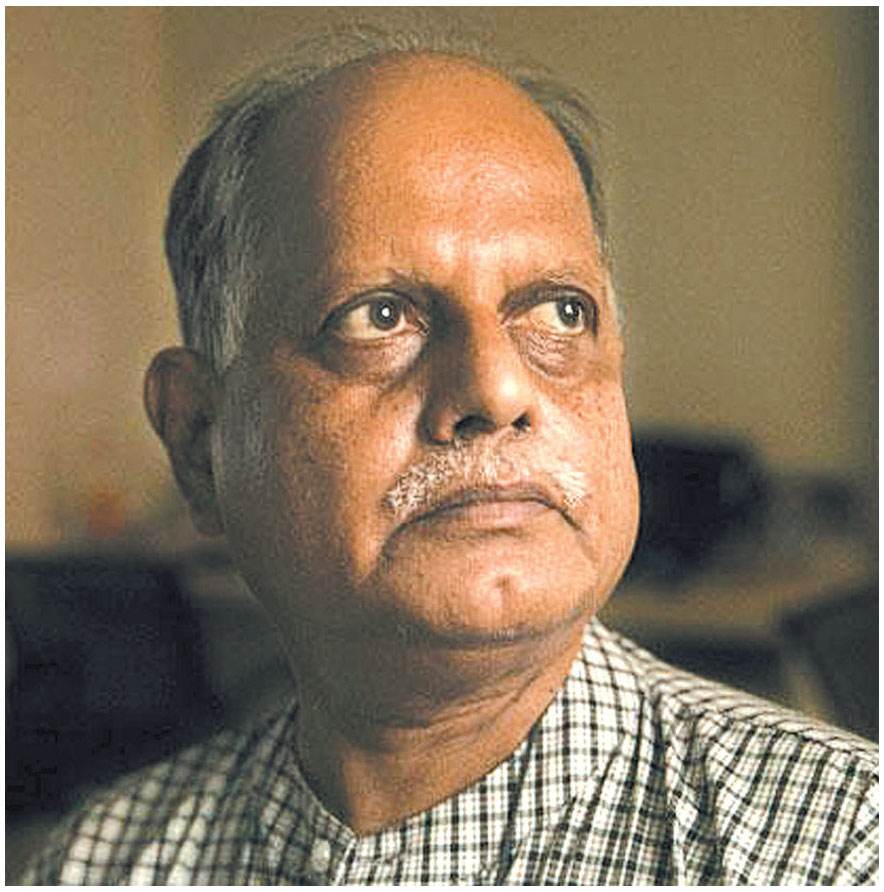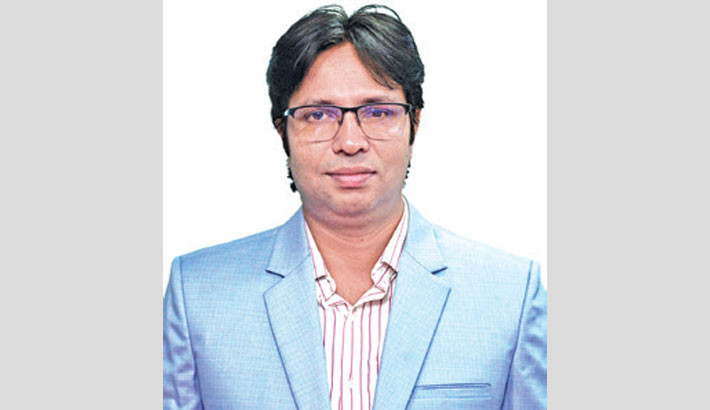Print: 02 Nov 2025
Bibhuranjan Sarkar has gone through a long chapter in the history of journalism, working as a journalist for more than five decades.
Through his life, he has demonstrated that journalism is more than just a game of words put in a pen; it is a name of responsibility that comes with costs, including neglect, loss of honour, and financial instability.
The last phase of Bibhuranjan's life is like a tragic poem, where the state, society and institutions did not stand by this pen-warrior.
He was involved in left-wing politics since his student life. Even during the Liberation War, his position was clear for freedom, for truth. Even during Ershad's tenure or the subsequent political upheavals, he wrote the truth, often anonymously, risking his life. But when the time came for him to get what he deserved, he was left out in the cold. Though he was often given Awami tag for his ideology had much to do with the political forces that led the Liberation War, ironically, in the last 16 years of Awami league governance, he was a forgotten name. Despite being a man of principles, he received no recognition, no pension and no state aid. What he truly deserved was not charity, but his rightful due. Regardless of political colour and creed, such a senior, honest and dedicated journalist should have been honoured and cared for.

In the twilight of his life, he was almost starving due to debt, medical expenses and family responsibilities. His only hope was the success of his children. But fate dealt them a cruel hand too. His brilliant daughter was ‘failed’ in a thesis exam, and his son, despite passing job exams multiple times, was denied employment. It seemed the entire political structure had turned a blind eye to his plight.
Why does this happen to journalists like Bibhuranjan? Why does the state fail to provide even the basics to those who dedicate their lives to truth and public service? Though decades have passed, the implementation of the 9th Wage Board remains a pipe dream in most media houses. The Ministry of Information has announced several times that strict action will be taken if necessary. But in reality, we have seen that the opposite image: houses have pushed the Wage Board into the dark by making excuses or lodging cases. In the meantime, many journalists have been working without honorarium for years while some survive only out of love for writing.
There is no financial security, no pension scheme, no health insurance and no long-term support for journalists. While other professions like academics, doctors and bureaucrats, enjoy retirement benefits, journalists are left to fend for themselves. The glaring inequality within the media industry is another elephant in the room. Some earn lakhs, while others do not even get a regular salary. Bibhuranjan painfully noted, "My department head's salary is almost double mine," even though the workload and contribution were no different. Such disparities are salt in the wound.
Should a person who gave the prime of his life to journalism die of starvation and debt? How many more Bibhuranjans must fall before we act? What he wanted in his lifetime was not much, a stable job, a fair salary, a secure future for the children, the ability to buy medicines.
Bibhuranjan’s death is not just the loss of one journalist but a mirror held up to our faces. It demands deep introspection from the media community, owners and the state. This is not just an end but must be a turning point. Journalists must be paid their due, respected for their contribution and protected by law. The implementation of the Wage Board must be enforced, and violators held accountable. A separate pension scheme, health insurance and emergency support fund are essential for securing the future of journalists.
But the rot is not just in the system; it lies within as well. Some so-called journalists, by riding the coattails of power, have climbed the ladder of wealth and influence. They wrote glowing praise pieces about the Liberation War, Bangabandhu, Sheikh Hasina or so-called development of Bangladesh, often whitewashing the truth, just to curry favour with the powerful. These flatterers have become media moguls, millionaires, frequent fliers. Yet, honest, idealistic journalists like Bibhuranjan were left in the shadows. While sycophants thrive, true journalists suffer. This is not an obscene paradox. It is a ticking time bomb for the future of journalism. The profession, once noble and revered, is being hollowed out from within.
Bibhuranjan's demise is a symbol of the collapse of a moral system. If we fail to hear the alarm now, worse days lie ahead. His death should ignite a new movement, a new consciousness. Let it be the spark that lights the fire to demand justice for the pen-warriors. If we forget him, we would not just forget a man, we would lose ourselves. We would lose the future of honest, free and fearless journalism.
Bibhuranjan Sarkar: Ink Ran Dry, So Did Hope

Bibhuranjan Sarkar has gone through a long chapter in the history of journalism, working as a journalist for more than five decades.
Through his life, he has demonstrated that journalism is more than just a game of words put in a pen; it is a name of responsibility that comes with costs, including neglect, loss of honour, and financial instability.
The last phase of Bibhuranjan's life is like a tragic poem, where the state, society and institutions did not stand by this pen-warrior.
He was involved in left-wing politics since his student life. Even during the Liberation War, his position was clear for freedom, for truth. Even during Ershad's tenure or the subsequent political upheavals, he wrote the truth, often anonymously, risking his life. But when the time came for him to get what he deserved, he was left out in the cold. Though he was often given Awami tag for his ideology had much to do with the political forces that led the Liberation War, ironically, in the last 16 years of Awami league governance, he was a forgotten name. Despite being a man of principles, he received no recognition, no pension and no state aid. What he truly deserved was not charity, but his rightful due. Regardless of political colour and creed, such a senior, honest and dedicated journalist should have been honoured and cared for.

In the twilight of his life, he was almost starving due to debt, medical expenses and family responsibilities. His only hope was the success of his children. But fate dealt them a cruel hand too. His brilliant daughter was ‘failed’ in a thesis exam, and his son, despite passing job exams multiple times, was denied employment. It seemed the entire political structure had turned a blind eye to his plight.
Why does this happen to journalists like Bibhuranjan? Why does the state fail to provide even the basics to those who dedicate their lives to truth and public service? Though decades have passed, the implementation of the 9th Wage Board remains a pipe dream in most media houses. The Ministry of Information has announced several times that strict action will be taken if necessary. But in reality, we have seen that the opposite image: houses have pushed the Wage Board into the dark by making excuses or lodging cases. In the meantime, many journalists have been working without honorarium for years while some survive only out of love for writing.
There is no financial security, no pension scheme, no health insurance and no long-term support for journalists. While other professions like academics, doctors and bureaucrats, enjoy retirement benefits, journalists are left to fend for themselves. The glaring inequality within the media industry is another elephant in the room. Some earn lakhs, while others do not even get a regular salary. Bibhuranjan painfully noted, "My department head's salary is almost double mine," even though the workload and contribution were no different. Such disparities are salt in the wound.
Should a person who gave the prime of his life to journalism die of starvation and debt? How many more Bibhuranjans must fall before we act? What he wanted in his lifetime was not much, a stable job, a fair salary, a secure future for the children, the ability to buy medicines.
Bibhuranjan’s death is not just the loss of one journalist but a mirror held up to our faces. It demands deep introspection from the media community, owners and the state. This is not just an end but must be a turning point. Journalists must be paid their due, respected for their contribution and protected by law. The implementation of the Wage Board must be enforced, and violators held accountable. A separate pension scheme, health insurance and emergency support fund are essential for securing the future of journalists.
But the rot is not just in the system; it lies within as well. Some so-called journalists, by riding the coattails of power, have climbed the ladder of wealth and influence. They wrote glowing praise pieces about the Liberation War, Bangabandhu, Sheikh Hasina or so-called development of Bangladesh, often whitewashing the truth, just to curry favour with the powerful. These flatterers have become media moguls, millionaires, frequent fliers. Yet, honest, idealistic journalists like Bibhuranjan were left in the shadows. While sycophants thrive, true journalists suffer. This is not an obscene paradox. It is a ticking time bomb for the future of journalism. The profession, once noble and revered, is being hollowed out from within.
Bibhuranjan's demise is a symbol of the collapse of a moral system. If we fail to hear the alarm now, worse days lie ahead. His death should ignite a new movement, a new consciousness. Let it be the spark that lights the fire to demand justice for the pen-warriors. If we forget him, we would not just forget a man, we would lose ourselves. We would lose the future of honest, free and fearless journalism.






